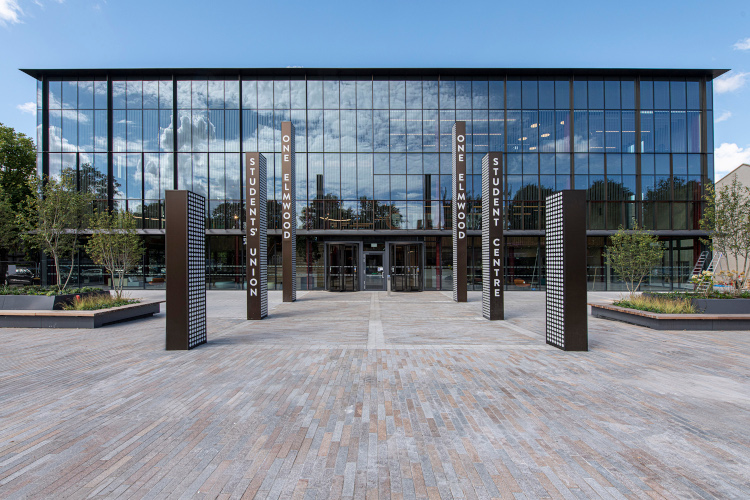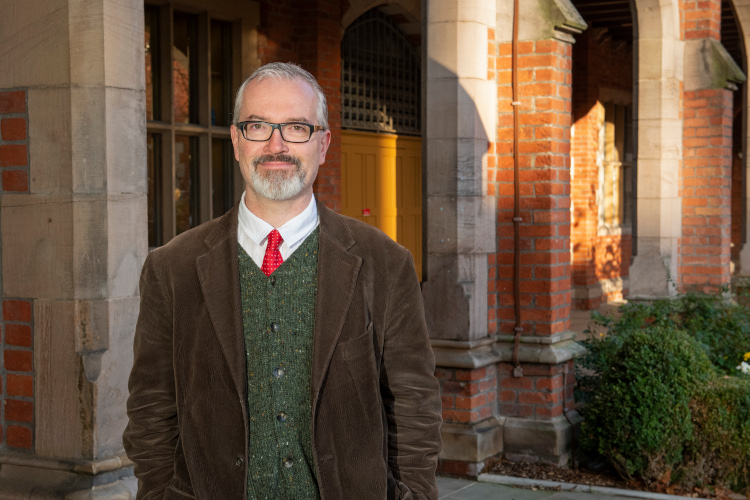Queen's : Looking to the Future
How can we help young people build resilience and prepare them for the early years post-university? Should Northern Ireland go global? What impact will the Belfast City Deal really have? How can you access the latest thinking and expertise on the biggest issues of the day? As we approach the middle decades of the twenty-first century, the Queen’s community – researchers, students and alumni – will engage with some of the greatest challenges of the age.

One Elmwood, the new Student Centre and Students’ Union (SU) building, is open. More than just a building, the new hub will revolutionise Queen’s student experience, bringing together essential student services alongside all the ingredients necessary for an excellent night out. Why? Because in 2022, anything less just won’t cut it.
“The old ‘Students’ Union’ was there for 50 years and was somewhat outdated,” says Wilma Fee (Modern History, 1978), the Director who led Academic and Student Affairs from vision through to her retirement less than a month before the doors opened. “We knew we needed something far more ambitious that would meet the needs of today’s students. This generation are entering a fiercely competitive job market, they usually work while studying, and they still want to socialise, gather and access the services they need. That’s not easy when those services are scattered far and wide across campus, making it hard to find them – or even realise they exist.
“Over the past few decades, the development of professional support services for students has grown significantly. It’s given the University cause to think how we could better use our estate to bring together both the SU and professional support services into one easily accessible facility to support the changing needs of current and future students.”
Enter, then, a brand-new building, One Elmwood, which has student experience right at the heart of its design. “When we started thinking about the new building, we looked at what 14 and 15-year-olds would expect,” says Caroline Young, Director of Student Plus, who was involved in writing the original brief. “This building is for their future. So, we looked at how they use technology, their digital footprints, how we bring in sustainability. And we found, also, that in today’s digital society, it can be hard for young people to engage. We need to help them do that and show them where to find information.”
That new accessibility ethos runs through the £40m building’s design. It’s a stunning, light-filled glass box, open to all, where any passers-by can see a hive of activity within. You might see students working on a sustainability project, a tech giant hosting a graduate recruitment initiative, or a club or society event. But that glass also reflects the University buildings around it, including the iconic Lanyon Building. Inside, a ‘lazy’ staircase winds its way through the entire building, with spots to sit along the way.
The former SU building had plenty of space, but much of it wasn’t used regularly. Part of the new building will include a new Mandela Hall, a large multi-purpose space that can be used for social events or visiting groups, but also major administrative activities. And there will be the SU shop, cafés and the Union bar. One Elmwood will also be used as a test bed for future innovation, such as, for example, launching a student’s business, with support from Enterprise SU and the University Careers and Employability Service. “We want students to feel like they own the building, and that they can play a part in it,” says Young.
“We’d love our students to get involved in as many things as they can and be as engaged as possible during their time here,” says Ciaran Higgins, Director of the Students’ Union. “And a one-stop shop, where University services and the Students’ Union are co-located, will help facilitate that. Before, you would walk into the old building and the range of services wasn’t visible. In the new one, perhaps you come to get your student ID or for a counselling appointment, but you see some friends and stay for a coffee. While you’re doing that, you might notice an event going on which interests you, or see a society you’d like to join. So, you come to the building and you stay in the building and engage in a vast range of services.”
Former Students’ Union President Katie Ní Chléire says that she can’t wait to make the most of the opportunity to do so much more. “I’m so looking forward to having this new space – for collaboration, for campaigning, for activities and for just hanging out with your mates. It is going to be a fantastic facility that students will benefit from for years and years to come. We want everyone to stop by – students and alumni alike. We welcome everybody!”

What does the Belfast Region City Deal have to do with cancer care? Professors Stuart Elborn and Judy Bradley say that patients are already feeling the impact of partnerships and funding – but that the real prize will be early access to innovative and potentially life-saving treatment for Northern Ireland.
When ‘Heather’ was diagnosed with Stage 4 incurable bowel cancer, she decided action was better than doing nothing. “I was offered the chance to take part in a clinical drug trial that would keep things at bay, and I just felt that was a better option than ‘nothing we can do’,” she says.
“I always liked the idea of trying clinical trials and have a family member who had a great experience – my cousin went on a clinical trial a number of years ago and it has kept everything under control for him. If there were no clinical trials, I don’t know where I would be. I remain positive – one day at a time and keep going.”
The Phase 1 trial Heather [not her real name] took part in is just one result of an ambitious partnership between Queen’s and healthcare industry collaborators, and is part of the Belfast Region City Deal. Named iREACH – Institute of Research Excellence for Advanced Clinical Healthcare – the programme looks set to push Belfast to the forefront of global clinical trial provision. It will deliver not only better health outcomes for the region – and worldwide – but also jobs, much-needed new infrastructure and a host of other benefits to local people.
Professor Stuart Elborn, Faculty Pro Vice-Chancellor for Medicine, Health and Life Sciences, has seen the evolution of clinical trials over nearly 40 years. “There is a huge opportunity here in Northern Ireland to deliver more medical trials that will accelerate the availability of new treatments to people,” he says. “These will hugely benefit our local population but the studies we will be doing are multinational and have wider benefit.”
Such trials are already one of Northern Ireland’s clinical strengths because of the joined-up nature of the region’s health and social care record-keeping. But the City Deal will bring exciting new opportunities, says Elborn. “The ability to scale up early phases is crucial, because for every 10 drugs that go through Phase 2 [the first round of testing of the compounded drug on trial participants], only about one makes it through. The investment required to get it to that point is expensive. But we’ll be able to do those early phases better, because they’ll be informed by population data. Northern Ireland can become a hub for early drug development validated in real patients.”
Trials such as the one Heather is part of could change outcomes for one of the most common cancers, says Elborn. “For patients themselves, we know that people who are involved in clinical trials have better outcomes in terms of quality of life and opportunity,” he says. But the benefits won’t be confined only to those, like Heather, who take part. “There are societal benefits. This will increase skilled jobs in this sector. Northern Ireland has a vibrant history of startups with new drugs, and we can encourage even more, both home-grown and companies attracted to us.” Elborn cites Queen’s partner Celerion, a US clinical trials specialist that already plans to increase its jobs footprint in the region and which will bring some of its European roles to Northern Ireland. Another firm will expand from 50 or 60 jobs to twice that number.
“Our work also spans other aspects of the City Deal,” Elborn says. “For example, software companies are increasingly involved in health. One of Apple’s interests is in health applications, such as tracking blood glucose on your phone. Tech firms will be able to use Northern Ireland as a ‘living lab’, so we get the benefit of being early adopters of new ways to deliver health and wellbeing.”
Professor Judy Bradley, the Director of the Northern Ireland Clinical Research Facility, was responsible, with colleagues, for creating a “joint vision on the focus of research during Covid” – one that mobilised the research community to ensure people in Northern Ireland had access to Covid clinical trials. “We were very successful in that delivery,” she explains. “Now, as we move out of Covid, our vision is to build on our agility to restart and regrow our research portfolios across the whole disease landscape – and iREACH is a key part of the recovery plan.”

Why does Northern Ireland need a global university? Professor Richard English says that from cybersecurity to poetry, and from heart surgery to community relations, diversity of voices and thought allows you to go further, faster. So, can Queen’s really help bring the world to NI – and take NI to the world?
Being a global university, says Professor Richard English, Pro Vice-Chancellor for Internationalisation and Engagement, isn’t just for the benefit of students. It also benefits the city of Belfast, Northern Ireland itself – and the wider world.
“No university can operate alone in the 21st century,” says English. “Of course, the issues that face Northern Ireland in particular are vitally important to us. But we should also be seeking global answers to the big problems that affect everyone from partners all over the world. Our research examines issues such as food security, cybersecurity and conflict resolution. The coronavirus pandemic, in particular, has shown how we can’t solve these problems by ourselves. But Queen’s plays a particular role for Northern Ireland, too. It is one of the more likely organisations both to send people out into the world and also to bring people here.”
And there is an economic as well as an educational and cultural benefit to being global, too. “People are sometimes concerned that bringing international students to Queen’s restricts opportunities for students from Northern Ireland,” says English. “But in fact, it’s the opposite. International students don’t have any affect at all on the numbers of home students we can take [this number is set by government] – indeed they bring much experience and insight. Our international partnerships, too, boost the University’s economy. An organisation that partners with us for research may then choose to do business here, bringing jobs.”
Northern Ireland is the world’s top region for foreign inward-technology investment, and Queen’s global outlook is highly attractive to firms eager to partner up on research projects and develop new technologies. While cybersecurity is a key area of expertise, the creative arts is another growth area, English points out. Belfast has become a centre for film and TV production, most famously Game of Thrones – an unsurprising creative boom when you consider Queen’s association with writers such as Seamus Heaney, Paul Muldoon and Anna Burns.
“You can’t switch on the TV without seeing a thriller that’s filmed in Northern Ireland,” says English. “Some of that and other important work has involved writers involved with the Seamus Heaney Centre, which now has visiting fellows that have included Line of Duty creator Jed Mercurio and Derry Girls creator Lisa McGee. It has been great to see so many people discovering that Northern Ireland is a great place for global operators to engage.”
And while the world comes to Queen’s, the University is also going out to the world. China Queen’s College (CQC), for example, is a joint college established in partnership with China Medical University in Shenyang. This venture has led to 800 Chinese students currently studying in Belfast. In the Middle East, Queen’s is partnering with Dubai Healthcare to develop the Mohammed Bin Rashid University. It also has partnerships with universities in the US including Harvard, Johns Hopkins and Stanford. “I’m particularly proud of a major conference we held at Queen’s with another internationally renowned partner, the University of Chicago, on a very big theme: the human impact of global conflict,” says English. “Both universities were present and there have been subsequent events in Chicago.”
At its best, he says, a university is where people find their lives transformed – by dialogue, education and the exchange of ideas – and you can’t have that unless you have international students, staff and partnerships. The campus is a place that draws on many different parts of the world. “Yes, there are challenges,” says English. “We have to think about ways of being inclusive that might involve listening to ideas that are very different from our own. But perhaps universities should be where these dialogues start to take place, in a non-damaging way. Everyone here has worked very hard to make that happen. I’d love to see a sense of connectedness, of alumni across the world, reaching out and feeling part of a Queen’s family, wherever they are.”
Top of Page